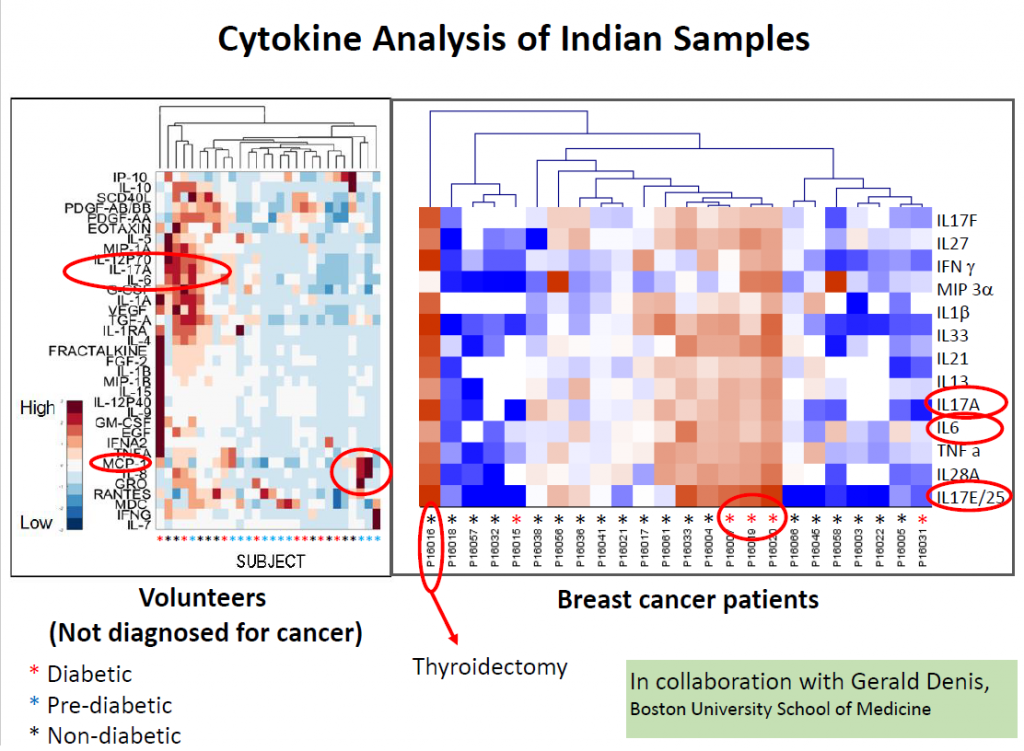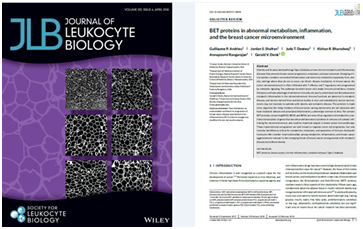
A collaborative project between Indian Institute of Science, Bangalore (IISc) & Boston University School of Medicine (BUSM), Boston, MA, USA
In 2016, Boston University Foundation – India (BUFI) provided a seed grant of INR 13 lakhs (~USD 20,000) to the Indian Institute of Science (IISc.) Bangalore to support a collaborative research project between IISc. and Boston University School of Medicine, titled Breast Cancer Risk among Lean Women with Type 2 Diabetes in India.
The collaboration between IISc. in Bangalore and Boston University School of Medicine (BUSM) in Boston, was a direct result of the US National Cancer Institute having identified scientific partnerships with India as a strategic priority. BUSM professor Gerald Denis was one of the first investigators invited to travel to India in 2014 as part of a US delegation to develop new ‘Provocative Questions’ for research. His interest is in the dramatic increase in Type 2 diabetes and breast cancer occuring in Indian women, and believe his team may have some insights into the mechanisms. He is collaborating on a clinical study with Professor Annapoorni Rangarajan with recruited subjects in Bangalore.
The BUFI grant proved crucial in providing seed fund for face-to-face meetings of the Principle Investigators both in India and the US, as well as training of a junior scientist from the Rangarajan Lab at BU. One of the aspects of the research is to compare populations in both the countries to assess the risk associated with lean diabetics getting cancer at later stages. Yet another objective is to identify element which may be responsible for generating breast cancer in lean-diabetic patients.
The project duration was 18 months and it’s conclusion in December 2017 has led to the creation of a unique database for clinical and research information across the US and Indian populations. In addition, a jointly authored review article for the Journal of Leukocyte Biology that includes members of both the IISc. and BU laboratories was published in April 2018.
The research work is significant because in longer run it may also lead to better prognosis and disease management protocols for breast cancer patients. These protocols could be adopted by hospitals. This could also lead to developing indigenous ways in which such patients are treated in India.
Context
Diabetes is on the rise. As of 2014, more than 420 million adults worldwide were living with diabetes. India has turned into the diabetes capital of the world with an excess of 70 million diabetics. It is projected that it will cross 100 million by 2030. Simultaneously, there is a rise in breast cancer incidences in Indian women. There was a 9% increase in breast cancer incidence between the durations 2009-11 and 2012-14. It is well known that cancer is associated with metabolic re-programming. While in the western population the risk of type II diabetes and breast cancer increases with obesity, most of the Indian diabetic population are likely lean. Yet, the relationship of lean diabetics with breast cancer risk and disease progression remains unknown. Inflammation may be one of the key players in driving the whole body metabolic disorders.
The Research
In association with Kidwai Memorial Institute of Oncology (KMIO), Bengaluru, the group at IISc is collecting medical records, tumor tissue and blood of breast cancer patients. KMIO is a government aided medical institute which caters mostly to the people of low socio-economic class. The preliminary analysis from medical records by the group at IISc show that more than 15% of the breast cancer patients had diabetes of which more than 35% have lean/normal body mass index.
An analysis of plasma samples for cytokines was done in association with Prof. Gerald Denis’ lab at Boston University. Analysis of plasma samples for cytokines can shed light on chronic inflammation. Similar analysis was conducted on breast cancer patient plasma samples from KMIO in IISc.
Preliminary results suggest that some of the pro-inflammatory cytokines are relatively higher in diabetic patients compared to non-diabetic patients. However, the analysis needs to be undertaken in a larger population and compared with non-cancer group to make a conclusion.

The Collaboration
The Rangarajan lab has initiated various strategies to understand what drives the pathogenesis in lean diabetics. The group is collecting medical records of patients who have already undergone surgery/ treatment for breast cancer. The data in these medical records help in understanding the disease progression and survival rates. Along with medical records the group is also collecting blood samples and tumor samples from breast cancer patients who are being admitted to hospitals. The lab is profiling for cytokine levels in patient blood plasma to study inflammation. Denis’s expertise in the field is helping the Rangarajan lab to understand the physiology of lean diabetics, their inflammation status and how lean diabetes correlate with the incidence of breast cancer.
There has been a continuous interaction between the two labs and recently Kishan Bhardwaj, a Ph.D. student from the Rangarajan lab, visited the Denis lab at Boston University Medical College to get trained on analyzing patient plasma samples for inflammatory cytokines.
Knowing these cytokine levels in patient plasma will help in risk stratification as well as in understanding the status of cancer stemness, drug resistance, metastatic potential of the cancer and finally the prognosis of the disease. In the US, Bhardwaj also had a brief discussion with medical oncologists at BU School of Medicine, Dr. Naomi Ko and Dr. Kim Bertrand. Clinical parameters considered for research purpose, follow up methods, awareness amongst common people and influence of socio-economic status on breast cancer diagnosis, treatment, disease progression, and follow up were a few key points discussed in the meeting. Establishing a healthy relationship and a cohesive working environment between the two labs has led to a database that would contain research and clinical information of cancer patients across both western and Indian population which will help better planning for disease control.

Annapoorni Rangarajan, PhD., Associate Professor, Molecular Reproduction, Development & Genetics, IISc. Bangalore, with members of her lab at IISc 
Kishan Bhardwaj (right) with members of Denis lab in Boston
Project Outcome

A jointly authored review article for the ‘Journal of Leukocyte Biology’ by members of both the Indian Institute of Science and Boston University laboratories got published in April 2018.
Dr. Rangarajan has vast experience in cancer biology, and the study of association of diabetes and inflammation in cancer risk and cancer progression is a relatively new research topic. To investigate metabolism and breast cancer cell properties of lean diabetic women, a prevalent condition in India, is best accomplished as a collaboration between established laboratories abroad that are investigating similar problems in obese women, a prevalent condition in the Western population. Shared reagents and expertise will make progress possible on the aims. Rangarajan’s team was beginning to initiate research on the association of diabetes with breast cancer in India, but lacked necessary funding to visit collaborators at BU, and purchase small equipment for the research project, hence the application to BUFI for a small grant.
After careful review of the proposal, the BUFI directors decided to provide a small grant to IISc. to seed the collaborative activities. The funds were primarily used to purchase Assay and Laboratory Supplies, and cover travel and training for data collection and for academic discussions. Data obtained through this funding also helped to seek further funding from agencies, both in India and abroad.
In addition, training opportunities for young researchers equipped them to contribute further in similar active and critical fields of research.